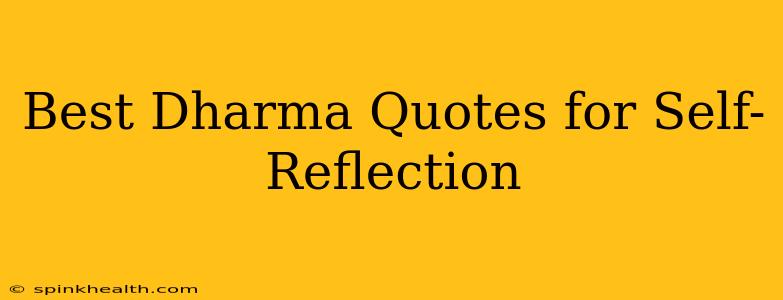Dharma, a concept central to several Eastern religions and philosophies, broadly refers to the cosmic order, righteousness, or the natural law of the universe. Exploring Dharma offers profound insights into our lives, fostering self-awareness and paving the way for inner peace. This exploration delves into some of the best Dharma quotes for self-reflection, prompting you to examine your actions, motivations, and place within the larger scheme of things. These aren't just words; they're invitations to a deeper understanding of yourself and your role in the world.
What is Dharma and Why is it Important for Self-Reflection?
Before diving into specific quotes, let's understand the core essence of Dharma. It's not simply about following rules; it's about aligning yourself with your true nature and purpose. Understanding your Dharma means understanding your unique path in life, your responsibilities, and your contribution to the world. Self-reflection through a Dharma lens allows you to:
- Identify your values: What truly matters to you? What principles guide your choices?
- Understand your motivations: Why do you act the way you do? Are your actions aligned with your values?
- Recognize your potential: What are your strengths? How can you best utilize your talents to serve yourself and others?
- Find purpose and meaning: What is your contribution to the world? How can you live a life of purpose and fulfillment?
Self-reflection based on Dharma principles encourages a life of intentionality and ethical living, leading to greater personal growth and inner peace.
Best Dharma Quotes for Self-Reflection:
Here are some powerful Dharma quotes, categorized for easier navigation, each followed by a short explanation to aid your self-reflection:
Quotes on Action and Right Conduct:
-
"The purpose of life is to live it, to taste experience to the utmost, to reach out eagerly and without fear for newer and richer experience." - Eleanor Roosevelt (Though not strictly a Dharma quote, it resonates with the spirit of living a fulfilling life aligned with one's Dharma). This quote encourages us to actively engage with life, embracing new experiences and pushing beyond our comfort zones to discover our true potential. Reflect on areas where you may be holding back and how you can embrace new opportunities.
-
"Work without attachment to the fruits of the work is the essence of Dharma." - Bhagavad Gita. This powerful quote highlights the importance of action without expectation of reward. Focus on the process, the contribution, rather than the outcome. This promotes inner peace and prevents disappointment.
Quotes on Self-Awareness and Inner Peace:
- "The only way to do great work is to love what you do. If you haven't found it yet, keep looking. Don't settle." - Steve Jobs (Again, not a traditional Dharma quote but deeply relevant to finding your purpose). Finding your Dharma is a journey of self-discovery. This quote inspires us to persevere in searching for our purpose, ensuring our actions align with our values and passions.
Quotes on Compassion and Service:
- "The best way to find yourself is to lose yourself in the service of others." - Mahatma Gandhi. This quote speaks to the power of selfless service. Reflect on how you can contribute to the well-being of others and find meaning in that contribution.
How to Use These Quotes for Self-Reflection:
To maximize the benefit of these quotes, engage in active self-reflection:
- Choose a quote: Select a quote that resonates with you most at this moment.
- Journal your thoughts: Write down your initial reaction to the quote. What emotions does it evoke?
- Connect to your experiences: How does the quote relate to your life, your actions, and your values?
- Identify areas for growth: What changes can you make in your life to align more closely with the message of the quote?
By using these quotes as prompts for self-reflection, you can embark on a journey of self-discovery, aligning your actions with your Dharma and creating a life filled with purpose, meaning, and inner peace. Remember, the path to understanding your Dharma is a personal one, requiring consistent self-awareness and a willingness to embrace change.

